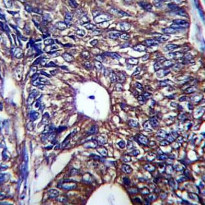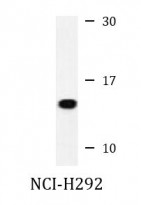ARG54994
anti-UQCRB antibody
anti-UQCRB antibody for IHC-Formalin-fixed paraffin-embedded sections,Western blot and Human
Cell Biology and Cellular Response antibody; Metabolism antibody; Signaling Transduction antibody
Overview
| Product Description | Rabbit Polyclonal antibody recognizes UQCRB |
|---|---|
| Tested Reactivity | Hu |
| Tested Application | IHC-P, WB |
| Host | Rabbit |
| Clonality | Polyclonal |
| Isotype | IgG |
| Target Name | UQCRB |
| Antigen Species | Human |
| Immunogen | KLH-conjugated synthetic peptide corresponding to aa. 19-47 (Center) of Human UQCRB. |
| Conjugation | Un-conjugated |
| Alternate Names | Complex III subunit VII; Complex III subunit 7; UQCR6; UQPC; QP-C; UQBP; Cytochrome b-c1 complex subunit 7; Ubiquinol-cytochrome c reductase complex 14 kDa protein; QCR7; QPC; MC3DN3; UQBC |
Application Instructions
| Application Suggestion |
|
||||||
|---|---|---|---|---|---|---|---|
| Application Note | * The dilutions indicate recommended starting dilutions and the optimal dilutions or concentrations should be determined by the scientist. | ||||||
| Positive Control | NCI-H292 |
Properties
| Form | Liquid |
|---|---|
| Purification | Purification with Protein A and immunogen peptide. |
| Buffer | PBS and 0.09% (W/V) Sodium azide |
| Preservative | 0.09% (W/V) Sodium azide |
| Storage Instruction | For continuous use, store undiluted antibody at 2-8°C for up to a week. For long-term storage, aliquot and store at -20°C or below. Storage in frost free freezers is not recommended. Avoid repeated freeze/thaw cycles. Suggest spin the vial prior to opening. The antibody solution should be gently mixed before use. |
| Note | For laboratory research only, not for drug, diagnostic or other use. |
Bioinformation
| Database Links | |
|---|---|
| Gene Symbol | UQCRB |
| Gene Full Name | ubiquinol-cytochrome c reductase binding protein |
| Background | This gene encodes a subunit of the ubiquinol-cytochrome c oxidoreductase complex, which consists of one mitochondrial-encoded and 10 nuclear-encoded subunits. The protein encoded by this gene binds ubiquinone and participates in the transfer of electrons when ubiquinone is bound. This protein plays an important role in hypoxia-induced angiogenesis through mitochondrial reactive oxygen species-mediated signaling. Mutations in this gene are associated with mitochondrial complex III deficiency. Alternatively spliced transcript variants have been found for this gene. Related pseudogenes have been identified on chromosomes 1, 5 and X. [provided by RefSeq, Dec 2011] |
| Function | This is a component of the ubiquinol-cytochrome c reductase complex (complex III or cytochrome b-c1 complex), which is part of the mitochondrial respiratory chain. This component is involved in redox-linked proton pumping. [UniProt] |
| Cellular Localization | Mitochondrion inner membrane. |
| Research Area | Cell Biology and Cellular Response antibody; Metabolism antibody; Signaling Transduction antibody |
| Calculated MW | 14 kDa |
Images (2) Click the Picture to Zoom In







